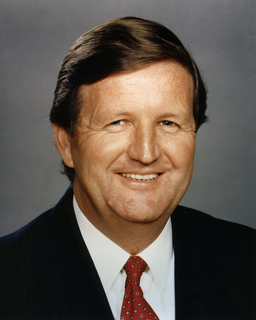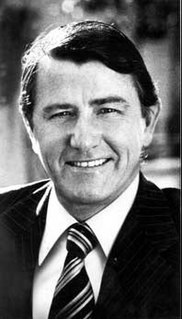
Laurence John "Laurie" Brereton is a former Australian politician who was a state minister, a federal member of cabinet, and kingmaker in the election of several Australian Labor Party leaders, including Paul Keating and Mark Latham. He was a Labor member of the Australian House of Representatives from March 1990 to October 2004, representing the Division of Kingsford Smith, New South Wales. He is credited with building Sydney's controversial monorail.

Barrie John Unsworth is a former Australian politician, representing the Labor Party in the Parliament of New South Wales from 1978 to 1991. He served as the 36th Premier from July 1986 to March 1988.
Deirdre Mary Grusovin was a Labor member of the New South Wales Parliament for over twenty five years.
John Joseph Aquilina, a former Australian politician, is a former member of the New South Wales Legislative Assembly representing the electorate of Blacktown between 1981 and 1991 and the electorate of Riverstone between 1991 and 2011 for the Labor Party.
Members of the New South Wales Legislative Assembly who served in the 48th parliament held their seats from 1984 to 1988. They were elected at the 1984 state election, and at by-elections. The Speaker was Laurie Kelly.</ref>
Members of the New South Wales Legislative Council who served in the 48th Parliament were elected at the 1978, 1981 and 1984 elections. Members served for three terms of the Legislative Assembly, which, as a result of the 1981 referendum meant the maximum term was twelve years. The 15 members elected in 1978 did not face re-election until 1988, the 15 members elected in 1981 did not face re-election until 1992 and the 15 members elected in 1984 did not face re-election until 1996. The President was Johno Johnson.</ref>

Elections to the 49th Parliament of New South Wales were held on Saturday 19 March 1988. All seats in the Legislative Assembly and a third of the seats in the Legislative Council were up for election. The Labor government of Premier Barrie Unsworth was defeated by the Liberal-National Coalition, led by Opposition Leader Nick Greiner.
Ronald Joseph Mulock AO KCSG was an Australian politician. A former City of Penrith mayor, he was an Australian Labor Party member of the New South Wales Legislative Assembly from 1971 to 1988. He was Deputy Premier of New South Wales under Neville Wran and Barrie Unsworth from 1984 to 1988.

Kenneth George Booth was a New South Wales politician, Treasurer, and Minister of the Crown in the cabinets of Neville Wran and Barrie Unsworth. From 1981 to 1988 he was the Treasurer of New South Wales. He was a member of the New South Wales Legislative Assembly for 28 years from 8 October 1960 until his death on 1 November 1988 for the Labor Party, representing the seats of Kurri Kurri and Wallsend.
Peter Thomas Anderson, a former Australian politician, was a member of the New South Wales Legislative Assembly representing Nepean between 1978 and 1981, Penrith between 1981 and 1988, and Liverpool between 1989 and 1995 for the Labor Party. During his parliamentary career, Anderson held a range of portfolios including Minister for Health, Minister for Aboriginal Affairs, Minister for Youth and Community Services, Minister for Local Government, Minister for Corrective Services, Minister for Police and Emergency Services between 1981 and 1988.

The Wran ministry (1976–1978) or First Wran ministry was the 71st ministry of the New South Wales Government, and was led by the 35th Premier of New South Wales, Neville Wran, representing the Labor Party. It was the first of eight consecutive occasions when Wran was Premier.

The Wran ministry (1978–1980) or Second Wran ministry was the 72nd ministry of the New South Wales Government, and was led by the 35th Premier of New South Wales, Neville Wran, representing the Labor Party. It was the second of eight consecutive occasions when Wran was Premier.

The Wran ministry (1980–1981) or Third Wran ministry was the 73rd ministry of the New South Wales Government, and was led by the 35th Premier of New South Wales, Neville Wran, representing the Labor Party. It was the third of eight consecutive occasions when Wran was Premier.

The Wran ministry (1981–1983) or Fourth Wran ministry was the 74th ministry of the New South Wales Government, and was led by the 35th Premier of New South Wales, Neville Wran, representing the Labor Party. It was the fourth of eight consecutive occasions when Wran was Premier.

The Wran ministry (1983–1984) or Fifth Wran ministry was the 75th ministry of the New South Wales Government, and was led by the 35th Premier of New South Wales, Neville Wran, representing the Labor Party. It was the fifth of eight consecutive occasions when Wran was Premier.

The Wran ministry (1984) or Sixth Wran ministry was the 76th ministry of the New South Wales Government, and was led by the 35th Premier of New South Wales, Neville Wran, representing the Labor Party. It was the sixth of eight consecutive occasions when Wran was Premier.

The Wran ministry (1984–1986) or Seventh Wran ministry was the 77th ministry of the New South Wales Government, and was led by the 35th Premier of New South Wales, Neville Wran, representing the Labor Party. It was the seventh of eight consecutive occasions when Wran was Premier.

The Wran ministry (1986) or Eighth Wran ministry was the 78th ministry of the New South Wales Government, and was led by the 35th Premier of New South Wales, Neville Wran, representing the Labor Party. It was the eighth of eight consecutive and final occasions when Wran was Premier.
A by-election was held for the New South Wales Legislative Assembly seat of Rockdale on 2 August 1986. It was triggered by the resignation of sitting Labor MP Brian Bannon. The by-election was won by Labor candidate and Premier Barrie Unsworth.
A by-election was held for the New South Wales Legislative Assembly seat of Bass Hill on 2 August 1986. The by-election was triggered by the resignation of sitting Labor MP Neville Wran. It was won by Liberal candidate Michael Owen.




